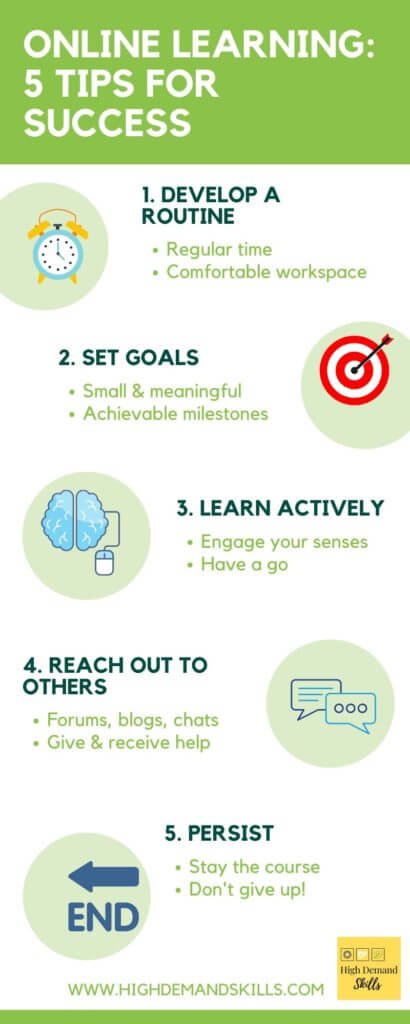The 5 Most Important Tips for Online Learning Success
Online learning is both rewarding and challenging. It offers ease and flexibility but has unique demands, making it harder than it may first appear.
With a few helpful tips however, online learning can be enjoyable and successful. Here are five tried and tested approaches for ensuring success in your online learning journey.
Online learning has become the go-to method for gaining new skills and qualifications in today’s connected world. Online courses are flexible and cost-effective, with a multitude of choices and a wealth of resources to help you along your way.
Sounds easy, right? Not necessarily.
Despite its many benefits, online learning can be a challenge. Courses are typically on-demand and designed around self-paced learning. If you’re not the self-disciplined type, online courses can quickly fall to the wayside if life gets in the way.
So if you’re about to embark on an exciting new online course, your success may depend as much on your approach as on your enthusiasm.
Getting started
Remember that before you start any online course, it’s worth checking your prerequisite knowledge. Most courses specify what’s required, and while you generally don’t have to meet all the criteria any shortfalls can lead to a harder learning journey.
You’ll also need to check the minimum technical requirements – computer set up, browser version, software requirements etc. You may have unnecessary technical hurdles otherwise.
Assuming you have what you need to get started, the following 5 tried and tested tips will give you the best chance for success:
1. Develop a routine – Time, space and environment
The power of routine is easy to underestimate. An article in the Harvard Business Review highlighted that the daily routine of many accomplished painters, philosophers and scientists was essential for their success.
A good routine can improve your productivity and help you manage your workload. As author Mason Currey puts it “A solid routine fosters a well-worn groove for one’s mental energies and helps stave off the tyranny of moods”.
So what makes up a good routine?
There are many ingredients, but the most important relate to the right conditions of time, space and environment.
Choose a regular time to work on your studies. For some of us, an hour in the morning may work best while for others it may be in the evening, during a lunch break or late at night. The particular time of day doesn’t matter so much as being regular.
A good workspace is important as well. It’ll help you ease into a comfortable study session. It could be a dedicated desk at home, a favorite table at your local cafe or a study booth in a public library.
It also helps to have a space that is readily available and comfortable. Pay attention to the right kind of lighting, seating and ergonomics that work for you. The less time you spend setting up for a study session, the better.
If you’re working in public spaces then you’ll need to be organized in carrying what you need, so you can settle into your study session without too much fuss.
Closely linked to workspace is your choice of study environment.
Are you easily disturbed by background noise? If so, choose a quiet place for your study. If you prefer fresh air and sunshine, choose a space alfresco (weather permitting). If you prefer the buzz of others being around you, choose a public space like a cafe or library.
The important thing is to choose a space in which you feel comfortable and can most easily slip into a study mindset.
With the right kind of routine you can form a regular study habit. And the more this becomes a part of your daily life, then the less effort it will take to work through your course.
2. Set goals – Small, meaningful and achievable milestones
A course syllabus can seem daunting at first. The sheer volume of content, concepts and activities can overwhelm a new learner. A good way of dealing with this is to set study goals through milestones that are small, meaningful and achievable.
Plan your expected progress by marking out what you want to achieve and by when. Approximate timings are ok, but make sure that the milestones are meaningful and manageable. The idea is to motivate you, not to burden you.
Meaningful milestones ensure that you’re making significant progress as you complete them. Manageable milestones mean they are achievable.
Milestones will help mark your progress and provide a sense of accomplishment as you work through the course. This is a powerful way to keep you on track and feeling good about your progress.
3. Learn actively – Pay attention and have a go
There’s a time for both passive and active learning.
Passive learning is easier and involves listening, reading or watching something that’s been prepared for you. It requires minimal effort. It’s helpful in forming impressions and providing a sense of context, but generally only provides a shallow understanding.
Active learning takes effort and is harder to do, but it’s essential for ‘connecting the dots’ and developing a deeper understanding.
According to The Learning Hub, “Active learning promotes a deep, conceptual understanding of a topic that is the hallmark of rich learning … In an active learning environment, the student is engaged, empowered and excited to learn”.
So how do you achieve active learning? Not surprisingly, active learning involves activity. A simple way of remembering this is “pay attention and have a go”.
The more senses you engage, the easier it is to remember things.
The simple act of note-taking, for instance, forces you to understand, summarise and write (or type) information concisely. This requires attention and is more sensory and tactile than merely watching a video, for instance. The result is better memory retention and an improved understanding.
The next stage of active learning is to have a go. This is particularly important for technical material such as coding, mathematics or analytics, but also for creative areas such as writing or graphics.
By actively doing something, you’re forced to think through and resolve problems. You’re more likely to form a perspective towards achieving a desired outcome. This results in a deeper understanding and a better appreciation of underlying concepts.
It also forces you to practice doing the very thing that the course is designed to teach – a coder codes, for instance, and a writer writes, they don’t merely read or listen.
4. Reach out to other learners – Blogs, forums and groups
It’s easy to forget that in most online learning environments you’re not alone. This is made worse by the self-learning and on-demand nature of online learning, with hours spent in isolation looking at computer screens.
Online courses try to counter this by setting up formal groups, forums and blogs to encourage networking. This helps in solving problems, staying engaged, keeping motivated and, importantly, feeling a sense of community.
Why does this matter?
Engagement of this kind can make a real difference. At a practical level, it can help in resolving obstacles and seeking guidance on coursework. In a collaborative sense, it fosters an exchange of knowledge and ideas, which can lead to better learning outcomes.
This was highlighted by a recent study in Education Research International. It found that amongst business school students, a significant improvement in cognitive learning was observed due to interactions in online discussion forums.

5. Stay with it – Persistence
There may be times when it’s tempting to give up on an online course, either due to external pressures or frustrations with progress. There may appear to be insurmountable obstacles along the way.
Most issues can be resolved, however. It’s worth recognizing that a willingness to simply persist with a course, through thick and thin, will reap rewards by maximizing your chances of success.
An article in Science highlights this, by discussing the value of persistence. The author argues that the most important factor for a successful publication record amongst academic researchers is persistence. Not intellect or intuition, as many may think.
While most online courses are not quite as demanding as a research publication, the value of persistence applies just as much. Staying with an online course, even when progress becomes difficult or stalled, is really worthwhile.
Provided you have the right ingredients in place, persistence is the key to completing and ultimately succeeding in your online course experience.
In conclusion
Success in online courses relies on both the approach that you take and on your motivation.
By using the tried and tested tips discussed in this post, you’ll have an enjoyable and productive learning experience and your chances of success will be maximized.

